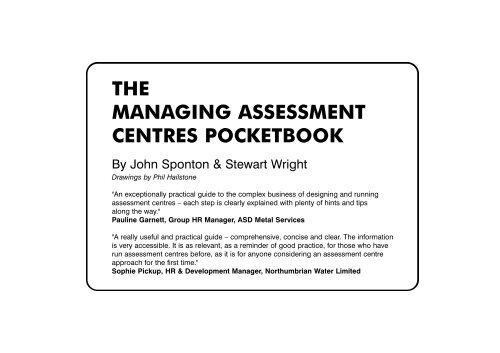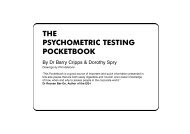the managing assessment centres pocketbook - Management ...
the managing assessment centres pocketbook - Management ...
the managing assessment centres pocketbook - Management ...
Create successful ePaper yourself
Turn your PDF publications into a flip-book with our unique Google optimized e-Paper software.
THE<br />
MANAGING ASSESSMENT<br />
CENTRES POCKETBOOK<br />
By John Sponton & Stewart Wright<br />
Drawings by Phil Hailstone<br />
"An exceptionally practical guide to <strong>the</strong> complex business of designing and running<br />
<strong>assessment</strong> <strong>centres</strong> – each step is clearly explained with plenty of hints and tips<br />
along <strong>the</strong> way."<br />
Pauline Garnett, Group HR Manager, ASD Metal Services<br />
"A really useful and practical guide – comprehensive, concise and clear. The information<br />
is very accessible. It is as relevant, as a reminder of good practice, for those who have<br />
run <strong>assessment</strong> <strong>centres</strong> before, as it is for anyone considering an <strong>assessment</strong> centre<br />
approach for <strong>the</strong> first time."<br />
Sophie Pickup, HR & Development Manager, Northumbrian Water Limited
WHAT<br />
INTRODUCTION 5<br />
What is an <strong>assessment</strong> centre?,<br />
applications, benefits, necessary<br />
elements<br />
WHAT YOU ARE MEASURING 13<br />
Building a role profile, benefits of<br />
working with competencies, when in<br />
<strong>the</strong> recruitment process, legal matters<br />
HOW YOU WILL MEASURE IT 25<br />
Types of <strong>assessment</strong> exercises with<br />
pros and cons, making exercise choices,<br />
using an exercise matrix, off-<strong>the</strong>-shelf or<br />
tailored exercises?, potential suppliers,<br />
designing your own exercises<br />
WHO MEASURES IT 49<br />
Choosing & sourcing assessors,<br />
training, ORCE technique: observing,<br />
recording, classifying & evaluating<br />
behaviour, defining acceptable<br />
CONTENTS<br />
PLAN<br />
PLAN<br />
ADVANCE PLANNING 69<br />
The role of <strong>the</strong> organiser, getting<br />
started, setting timescales, timetables,<br />
venue choice & specification, preparing<br />
& briefing candidates, final preparation<br />
ON THE DAY 83<br />
Before candidates arrive, when <strong>the</strong><br />
assessors arrive, when <strong>the</strong> candidates<br />
arrive, briefing <strong>the</strong> candidates before,<br />
during & after <strong>the</strong> <strong>assessment</strong> centre<br />
WASH-UP & FEEDBACK 91<br />
Importance of <strong>the</strong> review session,<br />
setting rules & standards, completing<br />
<strong>the</strong> matrix, exploring <strong>the</strong> results,<br />
capturing discussions, communicating<br />
results, effective feedback<br />
REVIEWING THE PROCESS 101<br />
What to look for, capturing feedback<br />
from candidates & assessors, capturing<br />
exercise ratings, collating & monitoring<br />
results, comparing results to outcomes,<br />
development <strong>centres</strong><br />
Copyright protected – <strong>Management</strong> Pocketbooks Ltd
70<br />
ADVANCE PLANNING<br />
THE ROLE OF THE ORGANISER<br />
As <strong>the</strong> organiser, your role will be critical to <strong>the</strong> success of <strong>the</strong> <strong>assessment</strong> centre.<br />
The organiser’s role is a large one – planning <strong>the</strong> event and ensuring it runs smoothly on<br />
<strong>the</strong> day.<br />
An important consideration for <strong>the</strong> organiser is whe<strong>the</strong>r to appoint a separate individual<br />
to act as an event administrator at <strong>the</strong> <strong>assessment</strong> centre. The event administrator can<br />
meet and greet candidates, circulate appropriate paperwork to candidates/assessors and<br />
<strong>the</strong>n collect and collate completed paperwork.<br />
The organiser can also be an assessor, and/or act as an event administrator. However,<br />
<strong>the</strong> organiser should be careful not to overburden him or herself with <strong>assessment</strong> duties,<br />
and so allow sufficient time to undertake <strong>the</strong> management role.<br />
Copyright protected – <strong>Management</strong> Pocketbooks Ltd<br />
PLAN<br />
PLAN
ADVANCE PLANNING<br />
GETTING STARTED<br />
As <strong>the</strong> organiser of <strong>the</strong> <strong>assessment</strong> centre, leave nothing to C-H-A-N-C-E:<br />
Candidates – have been told where <strong>the</strong> <strong>assessment</strong> centre is running, what it will consist<br />
of, what <strong>the</strong>y need to do beforehand and what to bring with <strong>the</strong>m.<br />
Handouts and paperwork – all documents have been designed, checked and printed off<br />
ready for <strong>the</strong> day.<br />
Assessors – have been trained in <strong>the</strong> Observe, Record, Classify and Evaluate (ORCE)<br />
process, are familiar with any exercises in which <strong>the</strong>y are involved, clear about <strong>the</strong>ir roles<br />
and legal responsibilities and know where <strong>the</strong>y need to be and when.<br />
Nasty surprises – you are prepared for worst-case scenarios.<br />
Catering and venue – break times and meals are fully catered for, <strong>the</strong> venue has been<br />
booked and rooms checked for suitability.<br />
Equipment – external materials and/or equipment have been ordered and are<br />
ready for use.<br />
PLAN<br />
PLAN<br />
71<br />
Copyright protected – <strong>Management</strong> Pocketbooks Ltd
72<br />
ADVANCE PLANNING<br />
SETTING TIMESCALES<br />
As <strong>the</strong> organiser, you also need to plan:<br />
● When does <strong>the</strong> <strong>assessment</strong> centre need to take place? Remember that availability of<br />
assessors, as well as venue, will be a factor<br />
● When and how do assessors need to be booked and trained? Ideally <strong>the</strong>ir training<br />
should be carried out shortly before <strong>the</strong> first <strong>assessment</strong> centre takes place<br />
● When and how will candidates be told that <strong>the</strong>y are being invited to attend?<br />
● How long will candidates need to complete any online <strong>assessment</strong> exercises prior to<br />
<strong>the</strong> event?<br />
● When and how can candidates expect to receive news about <strong>the</strong> outcome and<br />
receive feedback on <strong>the</strong> results?<br />
Copyright protected – <strong>Management</strong> Pocketbooks Ltd<br />
PLAN<br />
PLAN
ADVANCE PLANNING<br />
SETTING TIMESCALES<br />
Top tips for <strong>the</strong> organiser:<br />
● Make up a master plan which captures all <strong>the</strong> details (you could use project<br />
management software or a spreadsheet program) so that you are clear exactly what<br />
needs to happen and by when<br />
● Make sure that your plan covers <strong>the</strong><br />
requirements of candidates,<br />
assessors, exercise suppliers,<br />
<strong>the</strong> venue and any consultants<br />
who might be involved<br />
● ‘Walk through’ your plan from<br />
<strong>the</strong> perspective of each of <strong>the</strong>se<br />
groups to check that you have not<br />
missed anything<br />
PLAN<br />
PLAN<br />
73<br />
Copyright protected – <strong>Management</strong> Pocketbooks Ltd
74<br />
ADVANCE PLANNING<br />
DRAFTING A GOOD TIMETABLE<br />
A good <strong>assessment</strong> centre needs a good timetable which takes account of:<br />
● How long each individual exercise needs to be introduced, administered and run<br />
and with which candidates and which assessors. Be particularly careful with<br />
allowing time for any open-ended or non-timed exercises such as certain<br />
psychometric exercises – err upon more generous estimated completion times<br />
● How long each individual exercise needs for<br />
scoring<br />
● What o<strong>the</strong>r events or activities need to<br />
take place, such as any presentations to<br />
<strong>the</strong> candidates<br />
● Venue constraints such as <strong>the</strong> number and<br />
sizes of available rooms and equipment<br />
limitations<br />
● Break times<br />
Copyright protected – <strong>Management</strong> Pocketbooks Ltd<br />
PLAN<br />
PLAN
ADVANCE PLANNING<br />
TOP TIPS FOR A GOOD TIMETABLE<br />
● Try to keep it simple; factor in some slippage time for unexpected events such as a<br />
candidate or an assessor running late<br />
● Avoid group exercises first thing in <strong>the</strong> morning – allow <strong>the</strong> candidates a little time to<br />
relax in each o<strong>the</strong>r’s company. The best time for a group exercise is late morning or<br />
just before or after lunch – <strong>the</strong> latter keeps up candidates’ energy levels in <strong>the</strong> early<br />
afternoon!<br />
● At <strong>the</strong> start of <strong>the</strong> day, include an overview of <strong>the</strong> day’s schedule and (if appropriate)<br />
a company presentation. As well as sharing useful information, this helps candidates<br />
relax and allows <strong>the</strong>m to get used to <strong>the</strong> venue and each o<strong>the</strong>r<br />
● Make sure that <strong>the</strong> exercises which take longest to score, eg in-tray/analysis<br />
exercises, are given early on, to make full use of available assessor scoring time<br />
● Psychometric exercises generally involve a single assessor to administer, and are<br />
good to use when candidates might o<strong>the</strong>rwise be unoccupied<br />
● Some ‘break’ periods during <strong>the</strong> timetable are acceptable but avoid prolonged<br />
periods of inactivity for candidates<br />
PLAN<br />
PLAN<br />
75<br />
Copyright protected – <strong>Management</strong> Pocketbooks Ltd
76<br />
ADVANCE PLANNING<br />
CHECKING THE DRAFT TIMETABLE<br />
Now test your draft timetable thoroughly. Make sure that it works from all <strong>the</strong> different<br />
perspectives:<br />
● Candidates<br />
● Assessors – <strong>the</strong>y need time to review and classify <strong>the</strong>ir assessor observation forms<br />
and develop <strong>the</strong>ir evaluations. Also, after a group exercise, allow time for <strong>the</strong>m to<br />
discuss <strong>the</strong>ir findings before <strong>the</strong> main review session, enabling scores to be finetuned<br />
and calibrated. This is particularly relevant for scoring group exercises, where<br />
an individual candidate’s behaviour often needs to be seen in <strong>the</strong> context of what<br />
o<strong>the</strong>rs did or said at <strong>the</strong> time<br />
● Rooms<br />
● Catering and break times<br />
Make sure that no candidate is unduly advantaged or disadvantaged by <strong>the</strong> timetable –<br />
for example, any candidate planning time or ‘waiting’ time should be evenly distributed.<br />
Copyright protected – <strong>Management</strong> Pocketbooks Ltd<br />
PLAN<br />
PLAN
ADVANCE PLANNING<br />
VENUE CHOICE<br />
A well-designed <strong>assessment</strong> centre can easily<br />
be let down by poor venue facilities.<br />
Firstly, weigh up <strong>the</strong> pros and cons of using inhouse<br />
facilities against external facilities.<br />
Running <strong>the</strong> event in your organisation’s<br />
premises may be cheaper but challenge<br />
yourself as to <strong>the</strong> suitability of <strong>the</strong>se.<br />
● How might <strong>the</strong>se facilities<br />
appear to candidates?<br />
● Will your assessors<br />
concentrate as much as<br />
<strong>the</strong>y should at <strong>the</strong><br />
<strong>assessment</strong> centre if<br />
work-based distractions<br />
are present?<br />
PLAN<br />
PLAN<br />
77<br />
Copyright protected – <strong>Management</strong> Pocketbooks Ltd
78<br />
ADVANCE PLANNING<br />
VENUE SPECIFICATION<br />
When choosing a venue, check that:<br />
● The rooms to be used are suitable, particularly with regard to lighting, noiseproofing<br />
and technology facilities, and preferably are positioned close toge<strong>the</strong>r<br />
● Early access to <strong>the</strong> rooms can be gained on <strong>the</strong> day<br />
● Public or shared waiting areas are suitable for use by <strong>the</strong> candidates<br />
● It has been clearly agreed beforehand who is supplying any equipment – <strong>the</strong> venue<br />
organisers or you<br />
● Any fire drill arrangements and alarm-testing times will cause minimal disruption<br />
● The needs of any candidates with special requirements will be met<br />
Copyright protected – <strong>Management</strong> Pocketbooks Ltd<br />
PLAN<br />
PLAN
ADVANCE PLANNING<br />
PREPARING THE CANDIDATES<br />
Even before short-listing takes place, candidates should be told about <strong>the</strong> need,<br />
if short-listed, to attend an <strong>assessment</strong> centre and about possible dates. Those who<br />
are subsequently short-listed need to be told <strong>the</strong> chosen date as soon as possible.<br />
When communicating with candidates, imagine that <strong>the</strong>y are all customers of your<br />
organisation. Make sure any information sent out is crystal-clear and of a high quality.<br />
Put yourself in <strong>the</strong>ir shoes and identify what information you would like to receive if you<br />
were a candidate, and how you would like to be treated.<br />
The information and contact process with <strong>the</strong> candidate is an opportunity to present <strong>the</strong><br />
organisation in a positive light – one that is committed to best practice in <strong>assessment</strong>.<br />
PLAN<br />
PLAN<br />
79<br />
Copyright protected – <strong>Management</strong> Pocketbooks Ltd
80<br />
ADVANCE PLANNING<br />
BRIEFING THE CANDIDATES<br />
As soon as you can, send <strong>the</strong> short-listed candidates information about <strong>the</strong> <strong>assessment</strong><br />
centre. This should contain, as print-outs, attachments or micro-site links:<br />
● A note of congratulations for reaching this stage<br />
● Where and when <strong>the</strong>y need to attend, with maps and<br />
accommodation arrangements if necessary<br />
● The broad format of <strong>the</strong> <strong>assessment</strong> centre,<br />
descriptions of <strong>the</strong> exercises and how <strong>the</strong>y<br />
can prepare<br />
● Company information or background briefing<br />
● The job and person specification<br />
● Organisational policy on travel expense<br />
reimbursement to avoid misunderstandings<br />
at a later stage<br />
Copyright protected – <strong>Management</strong> Pocketbooks Ltd<br />
PLAN<br />
PLAN
ADVANCE PLANNING<br />
BRIEFING THE CANDIDATES<br />
You should also cover:<br />
● Clear instructions on <strong>the</strong> means by which and <strong>the</strong> date by when <strong>the</strong>y should confirm<br />
<strong>the</strong>ir attendance<br />
● What <strong>the</strong>y should bring – eg, examination proofs of achievement or copies of<br />
presentations<br />
● What <strong>the</strong>y should do beforehand – eg, whe<strong>the</strong>r any online <strong>assessment</strong> exercises<br />
need to be completed or presentations prepared for<br />
● Dress code information<br />
● Whom <strong>the</strong>y should contact in <strong>the</strong> event of any special requirements which may<br />
require adjustments to <strong>the</strong> exercises, and how to do this<br />
PLAN<br />
PLAN<br />
81<br />
Copyright protected – <strong>Management</strong> Pocketbooks Ltd
82<br />
ADVANCE PLANNING<br />
FINAL PREPARATION<br />
A day or two before <strong>the</strong> <strong>assessment</strong> centre is due to take place, <strong>the</strong> organiser should:<br />
● Confirm everyone’s attendance at <strong>the</strong><br />
event – this is particularly necessary<br />
with candidates who may be in high<br />
demand from o<strong>the</strong>r employers<br />
● Double-check that all materials are<br />
available and assessors are briefed<br />
● Confirm that <strong>the</strong> venue has full details<br />
of your booking and of your particular<br />
requirements<br />
As nothing is left to C-H-A-N-C-E, <strong>the</strong><br />
<strong>assessment</strong> centre is now ready to happen,<br />
like an orchestra ready to play!<br />
Copyright protected – <strong>Management</strong> Pocketbooks Ltd<br />
PLAN<br />
PLAN
About <strong>the</strong> Authors<br />
John Sponton, BSc Hons, PgDip, MSc, MCIPD, C.Psychol<br />
John is a Chartered Occupational Psychologist and Director of Informed<br />
Assessment Ltd. His career has involved roles in HR, psychometric test publishing<br />
and consultancy. He has extensive experience of <strong>the</strong> design and delivery of<br />
<strong>assessment</strong> processes for both recruitment and development. John is <strong>the</strong><br />
co-author of Succeeding at Assessment Centres in a Week, published by Hodder<br />
and Stoughton, and Managing Recruitment Pocketbook published by <strong>Management</strong> Pocketbooks.<br />
Contact: John can be contacted on 0845 606 6798 or at John.Sponton@InformedAssessment.co.uk<br />
Stewart Wright, BA Hons<br />
Stewart is a Director of Informed Assessment Ltd. Stewart worked initially in <strong>the</strong><br />
recruitment industry, gaining a thorough background in recruitment and selection,<br />
before specialising in career management, <strong>assessment</strong> and development for an<br />
international HR consultancy. Stewart’s practical experience includes <strong>the</strong> design<br />
and validation of selection processes, <strong>the</strong> design and delivery of recruitment related<br />
training workshops, selection exercise design, psychometric <strong>assessment</strong> and<br />
<strong>assessment</strong> centre management. Stewart is <strong>the</strong> co-author of Succeeding at<br />
Assessment Centres in a Week, published by Hodder and Stoughton, and<br />
Managing Recruitment Pocketbook published by <strong>Management</strong> Pocketbooks.<br />
Contact: Stewart can be contacted on 0845 606 6798 or at<br />
Stewart.Wright@InformedAssessment.co.uk<br />
Copyright protected – <strong>Management</strong> Pocketbooks Ltd





